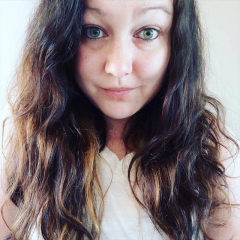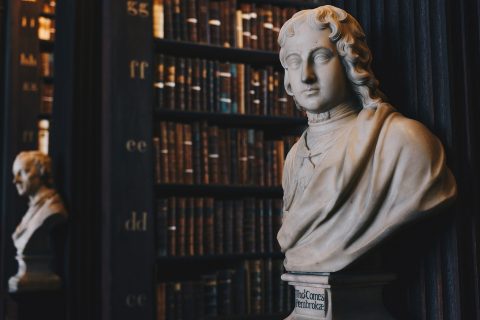Creative Writing (BA)
Why study Creative Writing?
Our Creative Writing program, one of the first of its kind in Canada, immerses you in every aspect of the writing life, from the development of ideas to the publication of finished works. As a Creative Writing student, you’ll learn to approach literature from a writer’s point of view as you develop your own craft under the guidance of published writers and fellow students.
Whether it’s through prose, poetry, or drama, our workshops help you find your voice and your subject. Creative writing students also have the opportunity to supplement their regular courses with master classes conducted by internationally renowned writers during the Writers Read at Concordia series. Concordia has hosted writers such as Julian Barnes, Dionne Brand, CAConrad, Roxane Gay, Renee Gladman, Jorie Graham, Ben Lerner, Daniel David Moses, Fred Moten, Claudia Rankine, George Saunders, A.E. Stallings, and Colm Tóibín.
Montreal’s vibrant English-language literary scene offers a showcase for the work of student writers as well as published authors. The skills acquired in our Creative Writing program can help prepare you for a professional life as a writer, editor, or publisher in print or in electronic media. The Honours in English and Creative Writing is a gateway to graduate study in literature or to further study in creative writing.
Program highlights
- Small class sizes enable students to workshop their writing as a group
- Opportunities to develop your writing across numerous genres
Special funding for out-of-province students
Up to $4000 for undergraduate programs.
Program structure
A Bachelor of Arts degree takes a minimum of three or four years (90 – 120 credits) of full-time study, depending on your academic background.
Program options
- Honours in English and Creative Writing (66 credits)*
- Major in Creative Writing (42 credits)
- Minor in Creative Writing (24 credits)
*Honours is a highly concentrated program, ideal for students planning to continue to graduate studies. If you are interested in Honours, speak with your program advisor in your first year of study at Concordia. Students applying to the University are able to apply to the major or specialization.
Courses
United States students: A U.S. Federal Student Aid-eligible version of this program is offered. This version meets all U.S. regulations (such as no co-operative education or e-courses) for eligible programs.
Admission criteria
Minimum cut-off averages and course requirements
- Quebec CEGEP: DEC
- High School: C+
- ACT or SAT is NOT required
- Canadian curricula course requirements
- Accepted international qualifications
- International Baccalaureate (IB) diploma: 26
- International Baccalaureate Career-related Programme (CP): 4.3/7
- Baccalauréat français: 11
- British system of education (GCE):
- A-levels: At least two A-level exams CD or
- AS-levels: At least 4 AS-level exams with equivalent results or
- BTEC: Level 3 Diploma or Extended Diploma in a related subject area with equivalent results
- Additional information for British System of Education (GCE) applicants
- University Transfers (internal/external): C
Additional requirements for admission
- Portfolio
- Letter of Intent
English proficiency
Some applicants may be required to write an English language proficiency test with the following minimum scores:
- TOEFL iBT (internet-based test) – a minimum score of 100 with 22 in the writing component
- IELTS – 7.0 overall with a 6.5 in the writing component
- DET score of 120 and above with no subscore under 90
Minimum cut-off averages should be used as indicators. The cut-off data may change depending on the applicant pool. Applicants who meet the stated minimum requirements are not guaranteed admission to these programs.
Application deadlines
It’s not too late to apply
Most undergraduate programs are still accepting applications for fall 2026.

FALL ENTRY (September)
Deadline: March 1
U.S. and international applicants: Apply no later than February 1 to allow time for immigration document processing. However, applying earlier is strongly recommended. Immigration processing times vary by country and delays could prevent you from starting your studies on time.

WINTER ENTRY (January)
Deadline: November 1
U.S. and international applicants: Apply no later than August 1 to allow time for immigration document processing. However, applying earlier is strongly recommended. Immigration processing times vary by country and delays could prevent you from starting your studies on time.
We reserve the right to close admission to a program at any time after the official deadline without prior notice.
After your degree
Graduates of the program have the knowledge and skill for any career that values critical thinking and superior communication skills, including a professional life as a writer, editor or publisher. You will also be prepared to undertake graduate studies in either English or Creative Writing.
Many graduates have fulfilling writing careers.
Student story

Jade Adams
Major in Creative Writing Minor in Professional Writing
How Concordia’s creative writing program helped Jade Adams find her own path.
Other programs of interest

Immerse yourself in the writing life – and develop a cultural vocabulary – by looking at the human condition through many literary modes, while studying works which include aspects of psychology, history, and philosophy.
Department
Faculty

Immerse yourself in the words of past poets or contemporary thinkers. With every turn of the page you have the opportunity to imagine and reflect on lives and worlds different from your own experience, and challenge your assumptions about the meaning of morality and the world from new and unanticipated perspectives.
Department
Faculty

Take on the narrative of the human story, through analysis and the re-interpretation of historical events.
Department
Faculty

